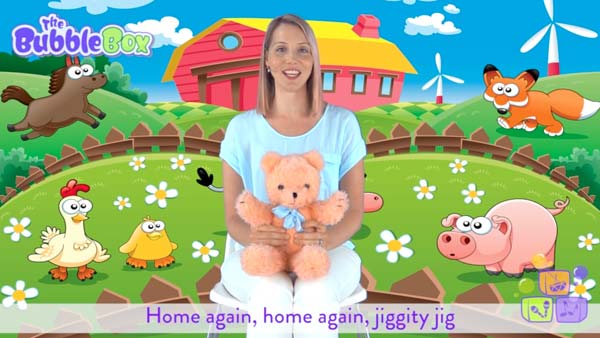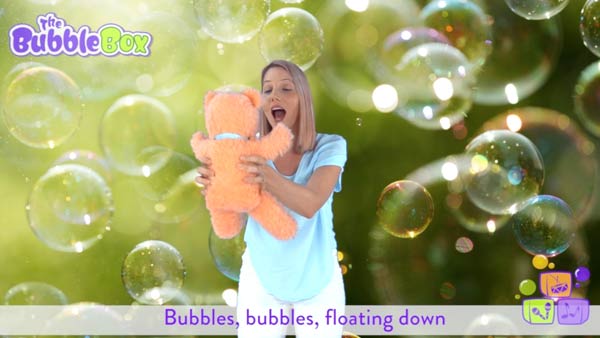Babies Learn English Through Music Activities
It is never too early for a child to start learning English! In fact, the best time for your child to start learning a second language is as a baby or young child.
Babies develop an awareness of all of the sounds of language through music and significantly through their parent’s singing and reciting nursery rhymes to them. One of the best ways to teach language is through music.

Do you you want to teach your baby English?
You can start teaching your baby English through music at home today. You don’t have to be a native English speaker or music expert to do English music activities with your baby. I have developed an 8 session online course, which teaches you how to do English music activities with your baby.
I demonstrate the activities through streaming videos with English words and lyrics for you to read along. You can watch the video sessions as many times as you like.
How can music help your child learn English?
There are 3 key ways music supports and promotes children’s English learning.
1. Music prepares the ear and brain to listen to and produce sounds. It is strongly linked to language learning. Music can help babies learn their native language but it can also help babies learn a foreign language.
2. Musical activity exercises the brain. When a baby listens to or sings along with nursery rhymes, both sides of her brain are accessed at the same time. Adding movement to this boosts mind-body brain development as well. Brain development is obviously crucial to all learning.
3. Music is a fun and natural way to learn. It captures and engages young children’s attention. It is well known that young children learn through play. Music is creative play with sound. It is a joyful and natural way for young children to learn and therefore is more effective than rote ways of learning such as flash cards.
How can The Bubble Box videos help my baby learn English?
1. Traditional English nursery rhymes make learning easy and fun
By watching The Bubble Box videos you will learn traditional English nursery rhymes with simple actions. Nursery rhymes are a great way to teach your baby English because they rhyme, are easy to remember, and fun to listen to. You will also learn simple actions to go with the rhymes which will help them attach meanings to words. Unlike animated or cartoon videos you will learn the words and actions from a REAL person – you can watch my lips, listen to my voice, read the words on the screen and copy the actions that I do.

Although your baby may like to listen to or watch some of the videos with you, it is important that you learn the songs and rhymes yourself as you are your child’s first and most valuable teacher. Your baby will learn much more from you than watching a screen. You can practise the rhymes with them throughout the day.
2. Lullabies prepare your babies ear, voice and brain for English
You will also learn some English lullabies to sing to your baby before bed time each night. Lullabies, songs and rhymes of each culture prepare a child’s ear, voice and brain for language. As your child listens to English falling asleep this is a soothing and wonderful way to encourage their English language learning.

You can sing along to the lullabies as you stream them from the website or Youtube channel. I recommend you play the sound only as babies should not be stimulated by watching a screen before bed.
3. English songs build your baby’s vocabulary
Many of the music activities in my program will teach you and your baby English vocabulary just by singing along and doing the actions. The actions teach the meanings of the words and build vocabulary. For example, in my song Bubbles, Bubbles everywhere you lift your baby into the air as you sing “Bubbles, bubbles in the air” and gently bring them down and sit them on the ground as you sing “Bubbles, bubbles floating down, bubbles bubbles hit the ground.” There are many more vocabulary building activities like this in my program.

So now that you know how easy it is to start your child’s English learning journey here are a few tips for using The Bubble box videos.
Tips for Using the Program
1. Repetition is the key
I am an early years school teacher and I use music in my classroom each and every day. Many of my students are from non-English speaking backgrounds and I know that incorporating music into my daily program helps them to learn English more quickly and effectively. My number one tip for teaching English to your babies is to repeat the songs and activities over and over again. When words are repeatedly sung or recited, it reinforces what was learned and stimulates the brain for better learning.
2. Keep going (don’t give up!)
Your baby may not be saying any words yet, either in English or in your native language, but don’t be discouraged. Just remember that there is a lot going on inside your baby’s brain that you can’t see! About 700 connections are created per second in a baby’s brain. And by the age of three, the brain has formed 1,000 trillion connections. These connections help the brain do everything from using a spoon to remembering the words to a song. The music activities you do with your baby every day are helping to build strong connections in your baby’s brain.
3. Give positive feedback
Whenever your baby responds to a music activity, whether it is physical or verbal (copying an action, making a noise etc) show delight and encourage them to continue. When eventually your child says their first English word, encourage him to say that word again and go on to new words, just as you would when they speak in their native language.
The Connection Between Music for Babies and Foreign Language Development
Here is a video presentation I gave in October 2016 for an online conference in Russia called the Play English Conference. In this video I go into more depth about the benefits of teaching your baby a second language, the connections between music and language development, young children’s brain development and recent research findings. If you are interested in learning more please watch and if you have any questions or feedback you can contact me.
Thank you for taking the time to visit The Bubble Box. I hope you have found the inspiration to start your child’s English learning journey today.
GOOD LUCK !
Join my 8 session online program of 100+ music activities for you and bub.
If a face-to-face music class isn't practical for you or your baby/toddler, consider my online program! I'll teach you how to do music with your little one in the comfort of your own home. I sing and demonstrate the actions - you’ll soon be singing along, sharing smiles and giggles and feeling great for playing an active role in your baby’s development.
30 minutes a week = a lifetime of developmental benefits.
